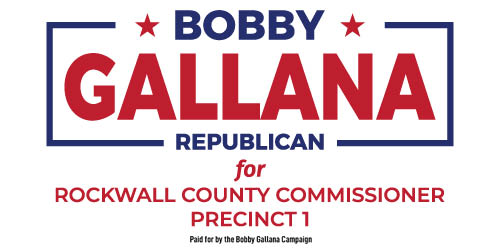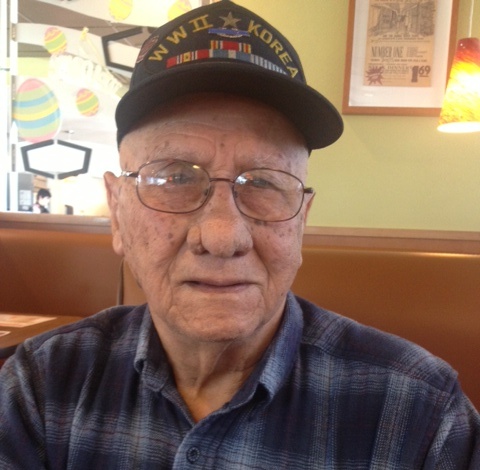 ROCKWALL/HEATH, TX (June 23, 2014) Vernon Ribera of Heath most certainly has a distinguished personal history. He is a retired professor of computer technology and Professor Emeritus at the University of Central Oklahoma, teaching at the university level from 1962 to 1990, and he is one of our nation’s patriot heroes.
ROCKWALL/HEATH, TX (June 23, 2014) Vernon Ribera of Heath most certainly has a distinguished personal history. He is a retired professor of computer technology and Professor Emeritus at the University of Central Oklahoma, teaching at the university level from 1962 to 1990, and he is one of our nation’s patriot heroes.
Vernon was orphaned at an early age and raised by his brothers and uncle. (His uncle was a WWI hero, fought in the trench-to-trench warfare and captured six German soldiers. He was awarded the Distinguished Service Cross for his outstanding service.) Apparently heroism is in the bloodline of this wonderful family.
Graduating high school at 16 years of age in 1944 from Boswell, OK High School,Vernon’s desire was to enter the military. He joined the Merchant Marines and trained in St Petersburg, FL. As a Merchant Marine, his travels would take him to South America, North Africa and Belgium.
Vernon joined the Army Air Corps at age 18 and at the end of his tour received an honorable discharge, at which time he entered Southeastern University in Durant, OK on the GI Bill. During this time he was a member of the Oklahoma National Guard and his unit was mobilized in 1950. He would serve in the Korean War in 1951 and 1952 with the US Army 180th Infantry Regiment of the 45th Infantry Division, of which General George Patton declared to be “one of, if not the best division in the history of American arms.” This division is known as The Thunderbirds.
The memories of that conflict are still vivid in Vernon’s mind. His unit would experience -27°F on Christmas day. (I’m sure that is too cold to sing White Christmas.) His platoon had no officer and Master Sergeant Vernon Ribera would lead his platoon as the first platoon of his company to see combat in the Korean War. They would be one of the most decorated platoons and a platoon that would suffer many casualties. Vernon says, “When I left Korea, my platoon had the most decorations of any platoon in the division so far as I know: Silver Stars, Bronze Stars, Purple Hearts, etc.” Never having an officer in the platoon meant Sergeant Ribera would be the platoon leader and platoon sergeant from beginning to end.
Their story is told in the fascinating book, A Very Long Weekend, written by Phil Berebitski. I would like to relate this story of valor and victory in summary form.
The Korean War is referred to as the “forgotten war” for various reasons. But toVernon and all those who served in Korea it was certainly the unforgettable experience of deadly warfare. These “weekend warriors,” as National Guard personnel are known, would leave their families and jobs and weekend drills and be thrust onto the battlefields of Korea. It would indeed be a very long weekend.
As National Guard units began to be called to active duty in Korea, the problem of training loomed large for all of the units, from infantry to artillery. At that time Army basic training was not required for the guardsmen. Two hours per week drill and two weeks at summer camp was the extent of their training, hardly a regimen for readying a unit for combat. For this reason, the NCO’s were as green as the new recruits.
The 180th Infantry was mobilized and reported to Camp Polk.Vernonand the other senior NCO’s were there for about a month, then sent to intensive leadership school at Ft Riley, KS for 6-7 weeks. Then upon returning to Camp Polk, the raw recruits, fresh from the induction center, had arrived and now it was up to these newly trained leaders to train these would-be soldiers starting with the basics of close order drill to the use of bayonets, the firing range, etc. This would be a needed crash course, but the 45th infantry would still be only be 43% combat effective when they left for Japan in 1951. They would be there for a time before deploying to Korea.
The Thunderbirds landed inKoreaon December 5, 1951. They were there to relieve the 1st Cavalry Division, andVernon’s “E” Company was the first to take over a sector from them. Sergeant Ribera spent the first night with the 1st Cavalry by himself, checking out the lay of the land and making sure he knew how to position his troops.
 The next day the order came from the Company Commander to take the first combat patrol, “Ribera, go out to Pokkae. Do a little reconnoitering and see what you can find.” Pokkae was a small village about 2 miles out, in the middle of a valley about 4 miles wide. It was known that the Chinese were on the hill on the opposite side of the valley.
The next day the order came from the Company Commander to take the first combat patrol, “Ribera, go out to Pokkae. Do a little reconnoitering and see what you can find.” Pokkae was a small village about 2 miles out, in the middle of a valley about 4 miles wide. It was known that the Chinese were on the hill on the opposite side of the valley.
Vernon says, “Your heart is in your throat. You don’t know what’s going to happen. Dead Chinese…all over, that’s the first thing we saw. It was unbelievable. Dozens and dozens and dozens of them all around. We didn’t see any GI’s, just dead Chinese. The carnage was unbelievable.” (This may have been a Chinese outpost that the 1st Cavalry had shelled.) They were out as far as they were to go, climbed a small hill, and that’s when Vernon saw “the mailbox.”
Vernon recalls, “This mailbox was an old ammo box turned upside down with slits cut in it, and it had little doves hanging all over it that someone had made. Next to it was a scraggly little Christmas tree and it also had these doves on it. It was propaganda. The wording on the box was kind of broken English…’Put a letter in here for some of your friends that have been captured. End the war.’”
Fortunately Vernon spotted wires at the bottom and a team was brought in to extinguish the bomb, which could’ve ended the lives of some of these soldiers on their first day.
“E” Company’s first raid was on January 12, 1952. Breaking camp at 2:00 am, they quietly made their way to T-bone Hill. At 6:00 am the attack began. “My platoon’s objective was the farthest out and we obviously had the farthest to go. It was 200 yards to the top of the hill and terribly steep. The Chinese were dug in at the top and had us at point blank range. They began rolling grenades down on us and bringing in mortar fire from somewhere.”
Just one of Vernon’s men got within 10’ of the summit and didn’t make it. Vernon was wounded when the bullet that wounded a squad leader, crouched beside him, also hit him. “We were out there about 300 yards beyond anyone else with about 10 men wounded and 4 men dead. All hell had broken loose…We felt we were lucky to get out at all…This isn’t easy to talk about. You always want to bring your men back if humanly possible. But I did not bring 4 of my men back. I couldn’t bring them back. I tried.” Sergeant Ribera could not jeopardize 40 more men to get the ones that he knew were already beyond hope.
Needless to say, these were dark days for the brave Thunderbirds. These were days of valor, disappointments and victories. The next time you hear anyone say that the Korean War was not a war, but a police action or civil conflict, remind them that even though it was the first war where political considerations took precedence over military needs in the field, it was a war. Brave men fought and died for the cause of freedom.
We thank God for the sacrifice of the dear ones that were lost, and we are truly blessed to meet and know those that came back to their families, such as Master Sergeant Vernon Ribera.
 Story and photos submitted by Blue Ribbon News special contributor John Adams of Rockwall. John serves as an Associate Pastor at Poetry Baptist Church. He is active in the Rockwall Breakfast Rotary. Visit his guest columns at BlueRibbonNews.com and his blog at written4u.com.
Story and photos submitted by Blue Ribbon News special contributor John Adams of Rockwall. John serves as an Associate Pastor at Poetry Baptist Church. He is active in the Rockwall Breakfast Rotary. Visit his guest columns at BlueRibbonNews.com and his blog at written4u.com.





